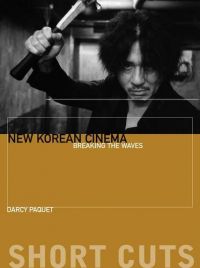When attempting to familiarise yourself with Korean cinema, it is
critical to develop an understanding of the country's turbulent and
trying socio-political history and its effect on cultural industry.
Thankfully, Darcy Paquet, a respected and influential film journalist in
Korea, sheds light on the matter with his 2009 publication “New Korean
Cinema: Breaking the Waves”.
“New Korean Cinema” is part of the extensive “Short Cuts” series of cinema books that concisely and comprehensively addresses a wide array of issues surrounding film and the industry itself. Top academics and experts in their respective fields cover all areas such as genre, film production and reception, film histories, global film industries, and critical concepts in film theory. The result is a fantastic resource for academics, cinephiles, or anyone with an interest in cinema or popular culture.



In “New Korean Cinema”, Darcy Paquet graphs the dramatic change in South Korea’s film industry from the late 1980s to the new generation of modern filmmakers in the 2000s. The book is divided into four chapters, each providing a detailed mapping of Korea’s film industry as it pertains to the social, political, economical, and cultural concerns of the time.



In the first chapter, entitled “A New Society”, the book outlines the oppressive years of the early 1980s and its damaging effect on Korean cinema as well as how this influenced a new generation of filmmakers to spark the “Korean New Wave”. The Korean film industry found itself in an “extraordinarily hostile environment” that stunted the industry's growth. Its influence on the development of Korea’s film industry is well presented in this chapter, noting landmark and representative films of the time such as Im Kwon-taek’s “Mandala”, Park Kwang-su’s “Chilsu and Mansu”, and Bae Yong-kyun’s “Why Has Bodhi Left for the East?” just to name a few.



The subsequent chapters, “A New Film Industry”, “The Boom”, and “New Ambitions” provide further understanding of some of the contextual influences that paved the way for the industry’s progressive march to becoming a major player on the world stage of cinema. Local factors, like the chaebol’s (large family-owned conglomerates such as Samsung and Daewoo) involvement in the industry and the controversial film quota system are discussed and presented with telling charts and discussions that shed light on how Korean cinema came to be the powerhouse of Asian cinema that it is today. Major films and rising auteurs of the early 1990s are noted as important bookmarks in the fascinating recent history of Korean cinema.
“New Korean Cinema: Breaking the Waves” is a comfortable read and a fascinating trip through Korea’s recent history and its relation to Korea’s film industry. It provides insight into the industry and will instil a greater appreciation and understanding of Korean cinema as it exists today. The more you know, the better it gets...
“New Korean Cinema” is part of the extensive “Short Cuts” series of cinema books that concisely and comprehensively addresses a wide array of issues surrounding film and the industry itself. Top academics and experts in their respective fields cover all areas such as genre, film production and reception, film histories, global film industries, and critical concepts in film theory. The result is a fantastic resource for academics, cinephiles, or anyone with an interest in cinema or popular culture.



In “New Korean Cinema”, Darcy Paquet graphs the dramatic change in South Korea’s film industry from the late 1980s to the new generation of modern filmmakers in the 2000s. The book is divided into four chapters, each providing a detailed mapping of Korea’s film industry as it pertains to the social, political, economical, and cultural concerns of the time.



In the first chapter, entitled “A New Society”, the book outlines the oppressive years of the early 1980s and its damaging effect on Korean cinema as well as how this influenced a new generation of filmmakers to spark the “Korean New Wave”. The Korean film industry found itself in an “extraordinarily hostile environment” that stunted the industry's growth. Its influence on the development of Korea’s film industry is well presented in this chapter, noting landmark and representative films of the time such as Im Kwon-taek’s “Mandala”, Park Kwang-su’s “Chilsu and Mansu”, and Bae Yong-kyun’s “Why Has Bodhi Left for the East?” just to name a few.



The subsequent chapters, “A New Film Industry”, “The Boom”, and “New Ambitions” provide further understanding of some of the contextual influences that paved the way for the industry’s progressive march to becoming a major player on the world stage of cinema. Local factors, like the chaebol’s (large family-owned conglomerates such as Samsung and Daewoo) involvement in the industry and the controversial film quota system are discussed and presented with telling charts and discussions that shed light on how Korean cinema came to be the powerhouse of Asian cinema that it is today. Major films and rising auteurs of the early 1990s are noted as important bookmarks in the fascinating recent history of Korean cinema.
“New Korean Cinema: Breaking the Waves” is a comfortable read and a fascinating trip through Korea’s recent history and its relation to Korea’s film industry. It provides insight into the industry and will instil a greater appreciation and understanding of Korean cinema as it exists today. The more you know, the better it gets...
-Christopher J. Wheeler

No comments:
Post a Comment